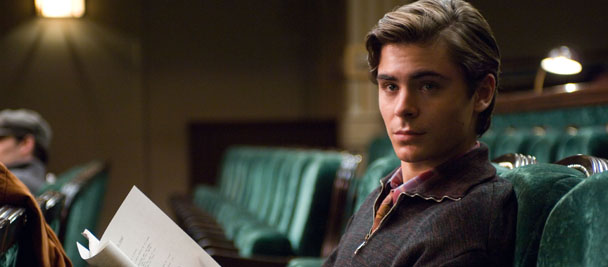Me and Orson Welles
At times it can feel like the film is acting as a showcase for Efron, and goes too far in trying to prove a point although he holds his own, dispelling any doubt that he can competently perform outside of his familiar all-singing, all-dancing territory.
Plot summary
A teenager is cast in the Mercury Theatre production of "Julius Caesar" directed by a young Orson Welles in 1937.

Set in 1937, Me and Orson Welles stars Zac Efron as hapless teenage fame-seeker Richard Samuels, who is cast in the Mercury Theatre production of Julius Caesar directed by Orson Welles. Richard negotiates the highs and lows of working with Welles and predictably falls for the beautiful Sonja Jones (Claire Danes) the ambitious theatre manager, who seems to welcome his tentative advances. As Richard becomes more embroiled with the production, and neglects his schooling for his big shot at acting, he comes to realise that his new lifestyle may not be all it seems.
“When you’re doing a film called Me and Orson Welles, you’d better find your Orson Welles” jokes director Richard Linklater. It may seem an obvious point to make but, Christian McKay, a newcomer to the big screen, channels the egotistical genius of Welles in a way that is crucial to the crux of the story. His vocal nuances are wonderfully accurate, and his physical resemblance to the young Welles helps a great deal to solidify the strength of his performance. You can understand Linklater when he says, “I felt the film gods were smiling on us when we found Christian.”
The only danger is that McKay tends to dominate when he is on-screen, with the danger that he outshines other actors in his scenes, as Welles would have done in real life. There is a real sense that McKay relishes in his role, able to hide behind such a fantastically dynamic alter ego, and in doing so, embodies a genuine and heartfelt portrayal.
However, equally important as the “Me” of the title, Efron holds his own in the film, dispelling any doubt that he can competently perform outside of his familiar all-singing, all-dancing territory. At times it can feel like the film is acting as a showcase for Efron, and goes too far in trying to prove a point. While not spectacular, he embodies the youthful cockiness of a young man picked out of a mundane life to work within the hubbub of a theatre troupe, and is endearingly vulnerable in the moments where Richard finds himself down on his luck.
The interaction between Richard and Sonja is well played, although Danes’ Sonja lacks any empathetic qualities, which dampens an otherwise astute performance. Her forthright attitude towards her ambitious plans to climb the career ladder gloss over the way she is treated by the powerful men in the film and, although she appears in control of her situation, she is a sorry character if not a sympathetic one.
The real strength of the film is its ability to replicate what it may have been like to work around Welles in the theatre, to bathe in the light of his praise or feel the sting of his casual dismissal, which is conveyed brilliantly throughout. While the dialogue is engaging and witty, it feels like Me and Orson Welles thinks it is cleverer than it really is. Although the film is charming with many tender moments between the characters, it doesn’t quite carry an emotional resonance to the extent that it should. The scenes that frame the film, Richard’s chance encounters with aspiring writer Gretta Adler (Zoe Kazan) showcase some delicately powerful acting, but are too clumsily placed in the narrative and so come off as insincere.
As Welles himself once said, “If you want a happy ending, that depends, of course, on where you stop your story” and, indeed, we are never quite sure what Richard really learns from his experience with Welles, if anything at all, although the resolution of the film is optimistic it feels a little empty.











COMMENTS